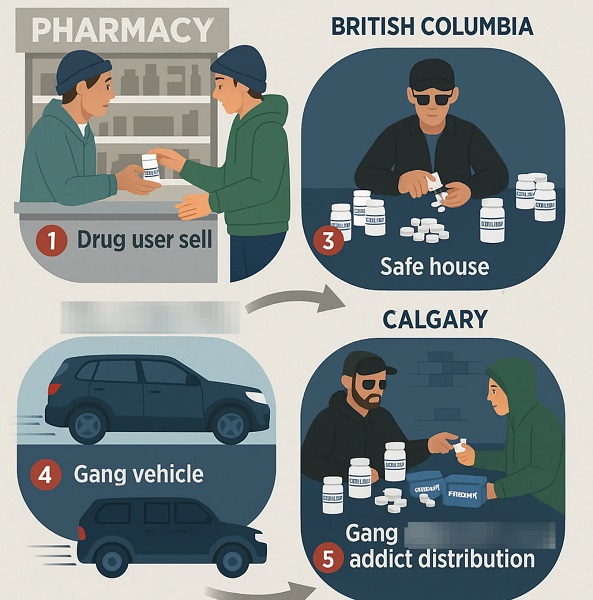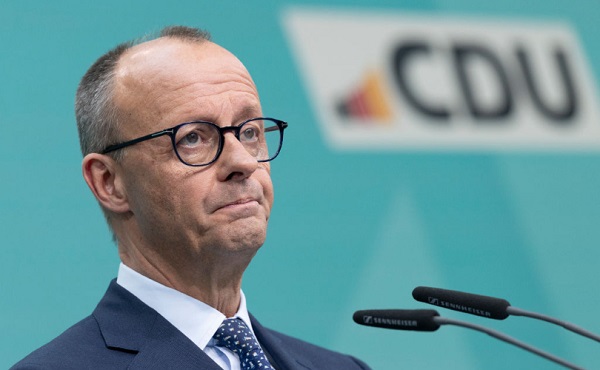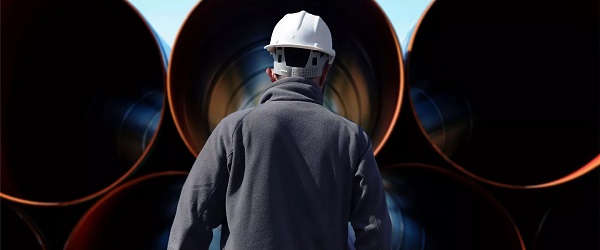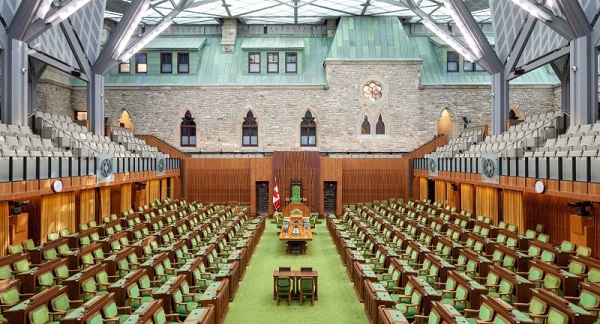Bruce Dowbiggin
No Taxes, No Winter, No Worries: The Florida Formula For Winning?
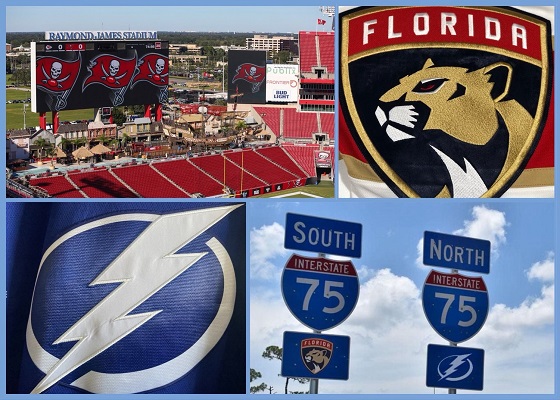
While the NHL pauses before the start of the final series, let’s catch up on a few issues emerging in the last month.
The re-appearance of the Florida Panthers to defend their Stanley Cup is their third consecutive time as Eastern Conference champions (they lost the Eastern Final in 2022). It also marks the sixth time since 2015 that a team from the state of Florida has made it to the Finals. If the Panthers win it will be four Cups in that period.
Which is amazing to those of us old enough to remember the Panthers and Lightning as the league’s doormats, the punchline to a bad joke about expansion to warm-weather locations. We can remember when the Cats games were events without a parking problem. Postgame, the tourists who made up the bulk of the small crowd would all hit the escape buttons on their rented cars to find them.
The sudden burst of success is, in part, attributable to the NHL’s tanking system in which teams with no hopes of a playoff series tried to get the best draft picks possible. Tampa had more luck earlier than Florida in this regard as a succession of top Panther picks fizzled while the Lightning picking stars like Vincent Lecavalier and Victor Hedman gave them a base on which to build Stanley Cup winners.
But the past decade has seen the Panthers pick up their draft game with franchise players Aleksander Barkov, Aaron Ekblad and Anton Lundell. The success of the Panthers and Lightning also can be traced to great trades such as Florida acquiring Matthew Tkachuk, a trade we deal with in depth in out current book Deal With It . In fact the Panthers have two former Calgary Flames leading them— Tkachuk and Sam Bennett.
But the two Florida teams are also benefitting from the new sports economics in which players making large, sometimes huge, salaries are choosing to play in a state which has no state income tax. The combination of much lower taxes, warm weather and the relative anonymity of being a hockey celebrity in cities that have NFL or NBA teams is proving a huge advantage in attracting or keeping star players. In fact it’s not just Florida but the four other no-tax states with NHL teams (Tennessee, Washington, Texas, Nevada) that are benefitting.

For example, the Nashville Predators handed out $108.5M in contracts to Brady Skjei, Steven Stamkos and Jonathan Marchessault within the first hour or two of 2024 free agency, while the Lighting outbid the Hurricanes for Jake Guentzel. This year the test case seems to be where Mitch Marner ends up as a UFA if he leaves Toronto. And wither Connor McDavid?
So much so that some are urging the NHL to punish the no-tax states to protect grotesque tax states like California, New York and Illinois and the hopelessly overtaxed Canadian provinces. Yes, there are players who prefer big cities like Toronto, L.A. and NYC. But many players like the combination of low taxes, high returns, anonymity and (sometimes) nicer winter weather.
The NHL did something along these lines earlier this century with its CDN relief scheme that protected the five extant teams against a 63-cent CDN dollar. But it’s hard to see what they can do if liberal governments keep demanding more of earnings. Already those governments are taking taxes from visiting players to balance their books. Much more pandering to overtaxing and the NHL Players Association would be within their rights to object.
Another flash point was the recent decision by Florida’s head coach Paul Maurice to not have coaches and staff involved in the traditional handshakes at the end of a playoff series. Maurice’s decision seemed to surprise Carolina coach Rod Brind’amour as they met beside the benches following the Panthers’ clinching win.

The handshakes are one of the NHL’s signature traditions— none of the other Big Four sports has the same. American announcers cite them as a positive display, and so there was some mystery over the move. “ I don’t believe that the coaches should shake players’ hands at the end,” Maurice said after. “There’s this long list of people in suits and track suits. We had like 400 people on the ice. They’re all really important to our group. But not one of them was in the game.
“When I first got in the league, you would never want to shake the players’ hands. Some coach wanted to get on camera is the only thing I can figure out, right? Maybe they wanted to shake Wayne Gretzky’s hand. I don’t know when it changed, but I don’t think it’s right. … When you think of all the great competitions on the ice, hard, going after each other, and yet they shake hands like that. That’s special. They’re not sending Christmas cards to each other. This is nasty out there. Something very special to it.”
But the sentiment did not extend to the Edmonton/ Dallas handshake line. The usual armies of coaches and support people were on the ice to shake hands. Which leads to the question, what will happen when the Panthers/ Oilers series ends? Will Maurice convince Edmonton coach Khris Knoblauch to forgo the mob scene? Or will Edmonton continue the tradition of full-court clasping?
Probably it will depend on who’s winning the Cup. If it’s Florida they can probably continue their new tradition. If it’s the Oilers it’s a good bet they’ll go whole hog. Which begs the question why do teams from the Western Conference refuse to touch the Campbell Trophy as champs of their conference but then want to touch everyone and everything in site after the game?
Inquiring minds will want to know.
Bruce Dowbiggin @dowbboy is the editor of Not The Public Broadcaster A two-time winner of the Gemini Award as Canada’s top television sports broadcaster, Bruce is regular media contributor. The new book from there team of Evan & Bruce Dowbiggin is Deal With It: The Trades That Stunned The NHL & Changed Hockey. From Espo to Boston in 1967 to Gretz in L.A. in 1988 to Patrick Roy leaving Montreal in 1995, the stories behind the story. In paperback and Kindle on #Amazon. Destined to be a hockey best seller. https://www.amazon.ca/Deal-Trades-Stunned-Changed-Hockey-ebook/dp/B0D236NB35/
Alberta
Why The Liberal’s Real Estate Economy Could Push Alberta Out of Canada

The real estate maxim goes something like, “Don’t buy the best house on a bad street.” For Albertans smarting from the recent election, that sentiment is starting to gain momentum. Seeing themselves as the credit card for Carney Canada, 47 percent of Albertans recently polled by Leger say they’d consider ending the ties that bind to Eastern Canada.
There are many emotional arguments for the surge from 27 percent pre-election to the current number— starting with unending equalization payments to ungrateful relatives in Quebec and Ontario. Most pertinent to those dismayed by the East’s infatuation with Mike Myers and hockey sweaters is the unsustainable Trudeau Easy Money economy, the real estate bubble that replaced conventional economy since 2015. (Trudeau’s decade left Canada with the lowest GDP in the western world and a $1.26T debt.)
There are now clear signs that the real-estate economy— in the form of condos— created by Trudeau’s post-modern philosophy is about to dive and take with it a good deal of wealth from Canadians and the financial industry. (RBC, the largest lender in Canada just reported $8.94 billion in loans that are unlikely to be paid back, up 13.5% from the first quarter.) And distancing themselves from an unrealized gains tax on principal residences might be a smart move for Alberta and whoever else wants to save their skin.

For the decade before Donald Trump called his bluff, Woke Canada bought Trudeau’s notion you could have wealth without work. The Trudeau notion of an economy was to de-industrialize Canada, resort to “clean” renewable power and live off the equity in Boomers’ homes. Oh, and use billions in tax dollars to push home prices higher for the past 10 years while importing four million new entitled folks.
As Trudeau’s advisor, Mark Carney subscribed to the idea that playing the real-estate game to fund a modern state, the way Albania once based its economy on a lottery. Municipal governments liked the idea of condo financing, because it returned maximum taxation from a small footprint—unlike the cumbersome factories and plants that left for the suburbs.
So they’ve doubled down on real estate while letting traditional industry go to the third world. @MikePMoffatt shows that government taxes and fees add up to $253K on a brand new $1.350M condo in Vancouver, or roughly 19 percent of the price. That $12,000 explains how taxes— and taxes-on-taxes— add over $250K to a Vancouver condo.
This tax hauls why municipalities are pitching hard on multiple-dwelling zoning as a cure-all. No wonder developers in Vancouver are still paying almost double the assessed value for land to build high density housing. In their haste to go big Vancouver realtors are now turning down borderline clients.
But this formula is falling apart. In Toronto, the average monthly rent is now about $2,250. For a condo costing $600K that means’ the investment is $1,800 under water. Little surprise that 20 percent of the city’s condo developments refuse to close. (What has happened to the missing 20 percent? Was it paid off or was it extended in some way?

The economy has seen this bubble coming and yet no one wants to end the party. And that is with tens of thousands of units still to come on stream. You hear stories in the condo/ construction industry in southern Ontario, the Lower Mainland of B.C. and Montreal where a typical builder sold 10 homes in past 12 months compared to the usual 40. Sellers are building exteriors but leaving inside unfinished just to keep crews working.
Some trades say they haven’t worked in a year as the glut suspends work. This is the cost for basing an economy on real-estate speculation. It’s why the Liberals played so hard for the Boomer vote in the election. Calm the aging by protecting the equity built up on their modest homes sitting on valuable property. Which punishes the younger voters who skewed CPC in the election.
While the population booms in Canada and condos sit empty, there remains a dire need for affordable housing in all the main urban markets— including Calgary and Edmonton. But real estate in Canada can’t function based on interest rates over three percent. There is huge political pressure from tax-hungry governments on the Bank of Canada to cut rates. This leads to expectations of 2.79% mortgage rates by the end of 2025.
Mortgage analyst Ron Butler @ronmortgageguy: “From the Feb 2022 peak the regions in Ontario that had the highest run up in 2021 have dropped 17% to 22%. And they will drop some more. We all have begun understand just how big a Catastrophe the 416 Dog Crate Condos have turned into”. (Those who remember the crash of 1980s-1990s have that t-shirt.)

Now replicate the same results across urban Canada. Thousands of owners walking away from underwater mortgages and poorly built homes. While the Big 6 banks can probably sustain writing off that much paper, the smaller funding industry is going to get hammered. Says Butler” “You can’t run 30-year lows in real estate transactions with a 50 percent higher population forever without pressure building from factors like Marriage Breakdown, Old Age & Employment change. But price recovery? More pain coming.
For those who bought the Liberals’ “Change!” Platform as a new economic plan based on frugality and efficiency, guess again. With Parliament prorogued the Carneyites have been ladling out billions of dollars both pre-and post-election to keep the economy from stagnating. Still, 1.4 million Canadians missed credit payments in the first three months of 2025, up 146K from this time last year.
Getting as far away from this economic collapse as possible might just be the biggest incentive for Albertans to run their own show in the future. Siphoning off energy profits to save Toronto and Ottawa from condo crates and phoney real estate developments is hardly a patriotic incentive. (To say nothing of getting away from the offshore money-laundering operations now thriving in Canada.)
Carney’s Throne speech that was supposed to woo the West was full of the usual Liberal bromides that sound good but are quickly swallowed by process and review. Then pipelines he promised in the campaign? Guess again. If he’d wanted to help Canadians he’d have adopted a tax structure like Ireland, Japan or Hong Kong that would eliminate 80 percent of CRA staff.
But he’s not dong that because the Ottawa region where those CRA people live is solid red. His election owed much to white-collar unions and media that polished his apple. The contradictions between Carney’s promises and reality will soon pile up. His Euro-based climate and social media policies will tell on a jaded public. His housing minister— who has promised to stabilize house prices— produced 170 percent jump in home prices while mayor of Vancouver.
Which will give Danielle Smith all she needs to introduce plans, if not for separation, then for a new decentralized Canada. Book it by 2027.
Bruce Dowbiggin @dowbboy is the editor of Not The Public Broadcaster A two-time winner of the Gemini Award as Canada’s top television sports broadcaster, Bruce is regular media contributor. The new book from there team of Evan & Bruce Dowbiggin is Deal With It: The Trades That Stunned The NHL & Changed Hockey. From Espo to Boston in 1967 to Gretz in L.A. in 1988 to Patrick Roy leaving Montreal in 1995, the stories behind the story. In paperback and Kindle on #Amazon. Destined to be a hockey best seller. https://www.amazon.ca/Deal-Trades-Stunned-Changed-Hockey-ebook/dp/B0D236NB35/
Bruce Dowbiggin
Caitlin Clark Has Been The Real Deal. So Her WNBA Rivals Hate Her
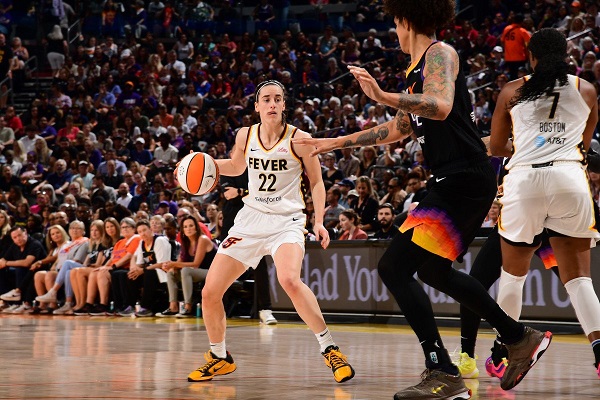
Breaking News from the WNBA: The Caitlin Clark experience is still a dumpster fire with her fellow players. Okay, let’s be honest: it’s the veteran black/ LGBTQ players who make up the league’s base. They are still seething over the attention Clark gets for jumps in TV ratings and sponsorships. But don’t take our word for it.
It can to be seen in recent on-court confrontations with black rivals Angel Reese and Rhyme Howard. The veterans of the NBA are happy to slap the newcomer around. They don’t like her slapping back. As we predicted in April of last year, “The most interesting reaction may come from the women already in the WNBA. The intrusion of a white, conservative, straight Catholic woman in their midst won’t sit well in a league where women of that description have been made to feel unwelcome in many dressing rooms.
“She’ll need a tough hide to survive the resentment of other players who see themselves as the stars and Clark as a product of white privilege.” Her first reality check came with being snubbed for the 2024 U.S. Women’s Olympic team. The veterans said they couldn’t trust a rookie. Sure.
To short-circuit the hate Clark tried reaching out to the black community of the WNBA. “I want to say I’ve earned every single thing, but as a white person, there is privilege,” Clark told Time. “A lot of those players in the league that have been really good have been black players. This league has kind of been built on them.” (Fact check”: the WNBA was a chronic money loser ignored by most sports fans before Clark.) Her outreach boomeranged, alienating her white fans while being ignored by most black players in the WNBA.
On last Friday’s First Take on ESPN, Stephen A. Smith was succinct. “As a result of her greatness combined with her being white, there are plenty of Black players who were excelling on the WNBA level for many years before Cailtin Clark ever arrived that didn’t receive that shine. So, there is resentment from the perspective that, ‘Damn, we were doing this and everybody’s trying to act like it’s just her.’
“…They do resent the fact that a white player comes along and they’re getting all of this shine when they were doing a lot of great things for the league and for themselves as individual players, and they didn’t receive that level of shine, that marketability, that pizzaz, etc., etc.”

MSN reported that Robert Griffin III and Ryan Clark of ESPN were on opposite sides of the argument. Griffin offered the opinion that a number of WNBA players treated Clark unfairly, because they were jealous of the publicity she was getting, and that she was viewed as something of a saviour to the league. In addition to her skill, the fact that Caitlin Clark is a white player appeared to turn up the heat in the argument.
By contrast, Clark said that he believed Clark was a talented player, and that she had recognized the great players who had come before her. However, he said there was a “racial component” to the way her fans attack certain players.”
The problem for those hating on Clark, who’s been everything advertised, is that she has brought attention to their sport, attention they failed to generate themselves despite national TV contracts and the chequebook of the NBA. The latest TV deal increased sixfold as Americans tuned in to see Clark. @TheBabylonBee cheekily sums it up. “Caitlin Clark Canonized As Saint After Performing Miracle Of Making Women’s Basketball Watchable.”
As we wrote last April, “That resentment has been naked and ugly from many who see themselves eclipsed by Clark’s obvious drawing power— and by their own inability to break the glass ceiling. As we have written on multiple occasions, women’s sports has been in search of a marketable messiah to change it from an ESPN liberal hype to mainstream.”
For many in the audience— including women— the image of these sports has become too political. As the gender revolt took hold, fans were turned off by the strident lesbian soccer player Megan Rapinoe and WNBA star Britney Griner who turned every game into a referendum on the latest #BLM talking points.”

In fact it was the insolent, angry face of Griner— here seen cursing out referees— that informed the public opinion of the WNBA as a league dominated by lesbians and #BLM militants. When Griner, jailed in Russia for foolishly taking marijuana products into that country, was later exchanged by president Joe Biden for a violent militant known as Doctor Death many bridled at surrendering a known criminal just to free a basketball player. They said it showed privilege of a different kind.
Clark isn’t the only white player getting the hard fouls. Her new teammate Sophie Cunningham got rag-dolled by Houston’s Kiki Iriafen, and then acknowledged “We have a target on our back”.
Meanwhile the Professional Women’s Hockey League is desperate for any kind of attention in the U.S. that might attract a TV contract. While receiving well-meaning support in Canada from TV and the media, it remains a sideshow on the American media landscape. Thanks to Clark the WNBA has an 11-year, $2.2B deal with Disney, Amazon Prime and NBC Universal. So far, the PWHL is still looking (the National Women’s Soccer League has a four year deal with $240M.
While no one is suggesting a racial/ gender conflict to spice up the product, it would help if there were a Caitin Clark on skates somewhere to rescue the league from insolvency.
Bruce Dowbiggin @dowbboy is the editor of Not The Public Broadcaster A two-time winner of the Gemini Award as Canada’s top television sports broadcaster, Bruce is regular media contributor. The new book from there team of Evan & Bruce Dowbiggin is Deal With It: The Trades That Stunned The NHL & Changed Hockey. From Espo to Boston in 1967 to Gretz in L.A. in 1988 to Patrick Roy leaving Montreal in 1995, the stories behind the story. In paperback and Kindle on #Amazon. Destined to be a hockey best seller. https://www.amazon.ca/Deal-Trades-Stunned-Changed-Hockey-ebook/dp/B0D236NB35/
-
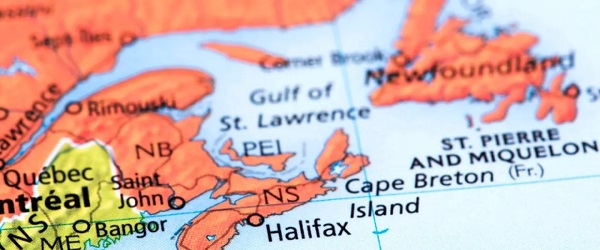
 Fraser Institute2 days ago
Fraser Institute2 days agoAtlantic provinces should focus on growth—despite Carney’s transfer policies
-
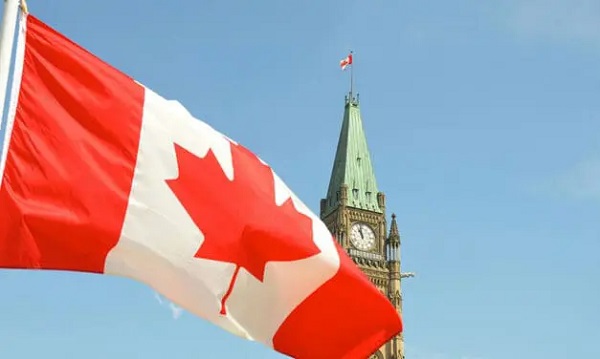
 Indigenous2 days ago
Indigenous2 days agoCarney’s Throne Speech lacked moral leadership
-

 Economy2 days ago
Economy2 days agoCanada Treats Energy As A Liability. The World Sees It As Power
-
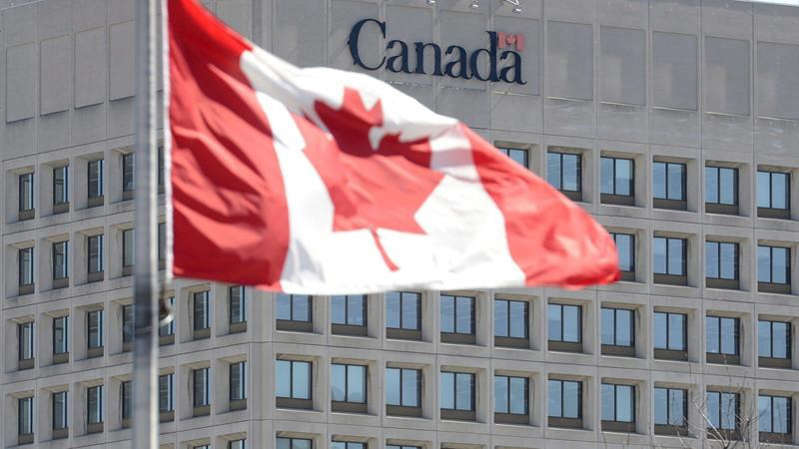
 Business2 days ago
Business2 days agoBureaucracy balloons while less than 50 per cent of government performance targets are consistently met
-

 conflict2 days ago
conflict2 days ago“Will Be in History Books”: Zelensky Hails Long-Range Drone Strike That Hit Dozens of Russian Bombers
-
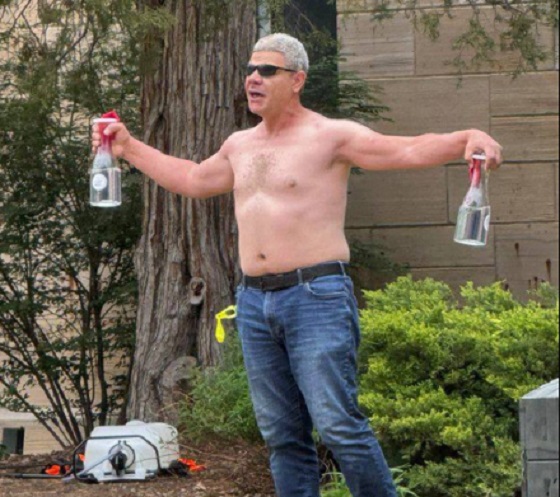
 Crime2 days ago
Crime2 days agoTerror in Boulder: Woman set on fire during pro-Israel hostage walk
-

 Addictions1 day ago
Addictions1 day agoSaskatchewan launches small fleet of wellness buses to expand addictions care
-
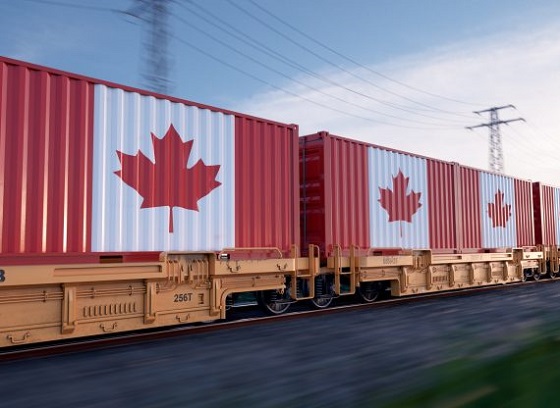
 Business1 day ago
Business1 day agoRemoving barriers to trade between Alberta and the rest of Canada could grow our economy by $72.1 billion, says the MEI


